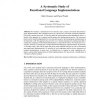Free Online Productivity Tools
i2Speak
i2Symbol
i2OCR
iTex2Img
iWeb2Print
iWeb2Shot
i2Type
iPdf2Split
iPdf2Merge
i2Bopomofo
i2Arabic
i2Style
i2Image
i2PDF
iLatex2Rtf
Sci2ools
128
Voted
TOPLAS
1998
1998
A Systematic Study of Functional Language Implementations
Abstract: We introduce a unified framework to describe, relate, compare and classify functional language implementations. The compilation process is expressed as a succession of program transformations in the common framework. At each step, different transformations model fundamental choices. A benefit of this approach is to structure and decompose the implementation process. The correctness proofs can be tackled independently for each step and amount to proving program transformations in the functional world. This approach also paves the way to formal comparisons by making it possible to estimate the complexity of individual transformations or compositions of them. Our study aims at covering the whole known design space of sequential functional languages implementations. In particular, we consider call-by-value, call-by-name and call-by-need reduction strategies as well as environment and graph-based implementations. We describe for each compilation step the diverse alternatives as ...
Related Content
| Added | 23 Dec 2010 |
| Updated | 23 Dec 2010 |
| Type | Journal |
| Year | 1998 |
| Where | TOPLAS |
| Authors | Rémi Douence, Pascal Fradet |
Comments (0)

